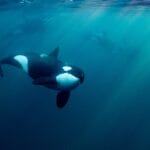
Scientists share new theory about orca ramming boats – they’re bored

Scientists at the International Whaling Commission (IWC) Scientific Committee’s 2024 meeting held in Bled, Slovenia, have reported some theories regarding orca encounters in the Atlantic. And the main one is the suggestion that the orca are bored. For the first time in a couple of generations the orca are well-fed, have leisure time and are experiencing fewer negative interactions with fisheries. They have time on their hands and are playing.
The IWC noted that in 2020, the first reports were received of a new behaviour between killer whales and vessels off the Iberian peninsula. Over recent years, killer whales have been ramming – and in some cases sinking – yachts cruising the waters around Spain and Portugal as whales vigorously push the rudder, often making the vessel unnavigable. At least 673 ‘interactions’ (not attacks) have been documented since the first was reported in May 2020.
In 2021, an ICG was established to assist the government of Spain with this issue and, in early 2024, members of the committee, and killer whale scientists, were invited to a workshop in Madrid sponsored by Spain and Portugal. The plan was to assess the whales’ behaviour and develop mitigation measures.
Consisting of over a dozen scientists and orca experts, the group’s findings posit that the encounters could be a result of the whales being bored and playful. The report suggests young juvenile orcas, who tend to be more curious and exploratory, started the trend, which then spread through the population.
“The sea is a very boring place for an animal,” Renaud de Stephanis, the president of Conservation, Information, and Research on Cetaceans, a marine-life preservation organisation, told USA Today.
“Imagine if you’re a dog or some other mammal, you can interact with objects around you. But in the sea there’s not much for the orcas to interact with, so they play with the rudders.”
Renaud de Stephanis
Outcomes of the 2024 Madrid orca workshop
The non-IWC workshop provoked deep discussion on the whales’ behaviour and resulted in a suite of recommendations and actions aimed at protecting both humans and whales.
Guidance was provided on immediate mitigation actions; international collaborations and reporting systems; a multi-faceted communications strategy; stranding response and post-mortem investigations; the consolidation of existing photo-ID, sightings and genetics datasets; and the need for a workshop on population modelling and genetic analysis.
Advisory group for ‘bored’ orca interactions
An advisory group was also established to provide advice on scientific and technical matters. The workshop also recommended that funding be sought for research projects to conduct genetic analysis on existing samples and to collate all available vessel location data with a view to better understanding inter-individual behavioural variation and movements in relation to vessels. Finally, the workshop recommended that the killer whale population be considered a candidate for a conservation management plan (CMP).
The committee endorses all the recommendations and actions detailed in the non-IWC workshop report and remains available to provide expertise to the governments of France, Morocco, Portugal and Spain as needed.
Killer whale interactions in other areas
Killer whale interactions with vessels were also reported from the Caribbean Sea, but these were few in number and quite different in nature to the behaviour described in the Strait of Gibraltar. Nonetheless, it was deemed prudent to develop a safety at sea educational campaign for killer whale vessel interactions and such information could be based on the guidelines developed for the Iberian Peninsula. The committee requested that updates be provided on this emerging behaviour as appropriate, from researchers, the Instituto Nacional de los Espacios Acuáticos (INEA) and the Ministerio del Poder Popular de Pesca y Acuicultura (MINPESCA), República Bolivariana de Venezuela.
According to the IWC, the maritime community is using various, often illegal, measures of its own to dissuade the whales from approaching vessels – which could be harmful to the whales.
The killer whale population along the Iberian coastline numbers some 40 individuals. It is listed as critically endangered and occurs seasonally along the Atlantic coastline of Spain and Portugal and in the waters of the Straits of Gibraltar.
The post Scientists share new theory about orca ramming boats – they’re bored appeared first on Marine Industry News.
